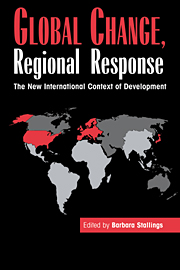Book contents
- Frontmatter
- Contents
- List of tables and figures
- List of contributors
- Acknowledgments
- Abbreviations
- 1 Introduction: global change, regional response
- Part I Global changes
- Part II Regional responses
- 7 The East Asian NICs: a state-led path to the developed world
- 8 Southeast Asia: success through international openness
- 9 Latin America: toward a new reliance on the market
- 10 Sub-Saharan Africa: underdevelopment's last stand
- Part III Conclusions
- Index
7 - The East Asian NICs: a state-led path to the developed world
Published online by Cambridge University Press: 05 June 2012
- Frontmatter
- Contents
- List of tables and figures
- List of contributors
- Acknowledgments
- Abbreviations
- 1 Introduction: global change, regional response
- Part I Global changes
- Part II Regional responses
- 7 The East Asian NICs: a state-led path to the developed world
- 8 Southeast Asia: success through international openness
- 9 Latin America: toward a new reliance on the market
- 10 Sub-Saharan Africa: underdevelopment's last stand
- Part III Conclusions
- Index
Summary
The East Asian newly industrialized countries (EANICs) – Hong Kong, Singapore, South Korea, and Taiwan – occupy a distinctive position in the international system. In the 1960s and 1970s, they were the chosen few that seized the structural opportunities for upward mobility in the international political-economic system. During the second half of the 1970s and early 1980s, they launched effective economic adjustment programs that enabled their economies to ward off the looming competition from the “second-tier NICs” of Southeast Asia and to moderate the new protectionist pressures in the OECD countries. As a result, in the mid-1990s, the EANICs are poised to become the first group of postcolonial states to join the ranks of the developed countries in the postwar era.
Since the mid-1980s, however, the EANICs have been facing a new set of challenges that threatened their established modes of capital accumulation and patterns of state intervention. Beginning in the early 1980s, both economic officials and business leaders in the EANICs found themselves operating in a very different international environment due to the epic changes in the global political system, the tumult in the international monetary regime, and the discord in the management of multilateral economic relations. To strike a balance between the need to harmonize their economic relations with their major trading partners and the need to facilitate the structural adjustment of their economies, EANIC governments were compelled to reset their policy priorities and retool their policy instruments.
- Type
- Chapter
- Information
- Global Change, Regional ResponseThe New International Context of Development, pp. 199 - 237Publisher: Cambridge University PressPrint publication year: 1995
- 8
- Cited by

